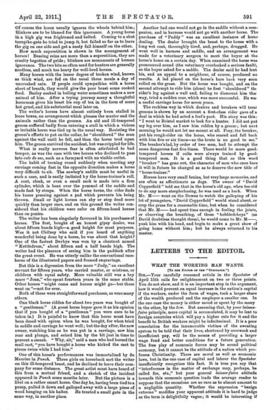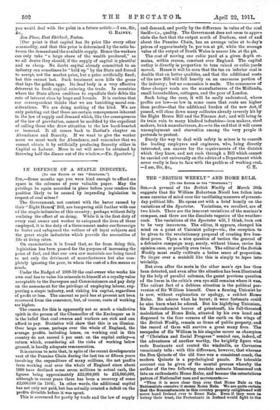LETTERS TO THE EDITOR.
WHAT THE WORKING MAN WANTS.
[To 5'E EDITOR 01 TH1 " SPZ01■101..1
Srn,—Your carefully reasoned article in the Spectator of April 15th calls for enlightenment on two or three points. You do not show, and it is an important step in the argument, how it would prevent an equal increase in the nation's capital if the workers, under the form of wages, took a larger share of the wealth produced and the employer a smaller one. In the one case the money is either saved or spent by the many in the other, by the few. But assuming that, by your laissez- faire principle, more capital is accumulated, it may be lent to foreign countries which will pay a higher rate for it and the benefit to British workers might be infinitesimal. It is a poor consolation for the innumerable victims of the sweating system to be told that their lives, shortened by overwork and insufficient pay, will be the means of providing a larger wage fund and better conditions for a future generation. The free play of economic forces may be sound political economy, but it cannot be the attitude of a nation which pro- fesses Christianity. There are moral as well as economic laws, but in the one case of capital and labour the Spectator insufficiently recognises this fact. It is true you say that "interference in the matter of exchange may, perhaps, be called for, etc.," but your general laisser-faire attitude towards this economic question leads the average reader to suppose that the occasions are so rare as to almost amount to a negligible quantity. Whether the expression " benign extreme " modifies your apparent attitude it is hard to judge as the term is delightfully vague ; it would be interesting if
you would deal with the point in a future article.—I am, Sir,
[Our point is that capital has its price like every other commodity, and that this price is determined by the ratio be- tween the demand and the available supply. Hence the workers can only take " a large share of the wealth produced," as we all desire they should, if the supply of capital is plentiful and so cheap. No doubt capital already committed to an industry can sometimes be " held up " by the State and forced to accept, not the market price, but a price artificially fixed; but this cannot last. Such treatment soon kills the goose that lays the golden eggs. Its dead body is a very effective deterrent to fresh capital entering the trade. In countries where the State allows creditors to repudiate their debts the rate of interest rises by leaps and bounds. It is curious that our correspondent thinks that we are banishing moral con- siderations. We are doing nothing of the kind. We are only pointing out that there are certain consequences inherent in the law of supply and demand which, like the consequences of the law of gravitation, cannot be modified by the expedient of calling those who draw attention to the law hard-hearted or immoral. It all comes back to Bastiat's chapter on Abundance and Scarcity. If we want to give the worker more we must work for Abundance, and remember that we cannot obtain it by artificially producing Scarcity either in Capital or Labour. More to eat will never be obtained by throwing half the dinner out of the window.—ED. Spectator.]







































 Previous page
Previous page